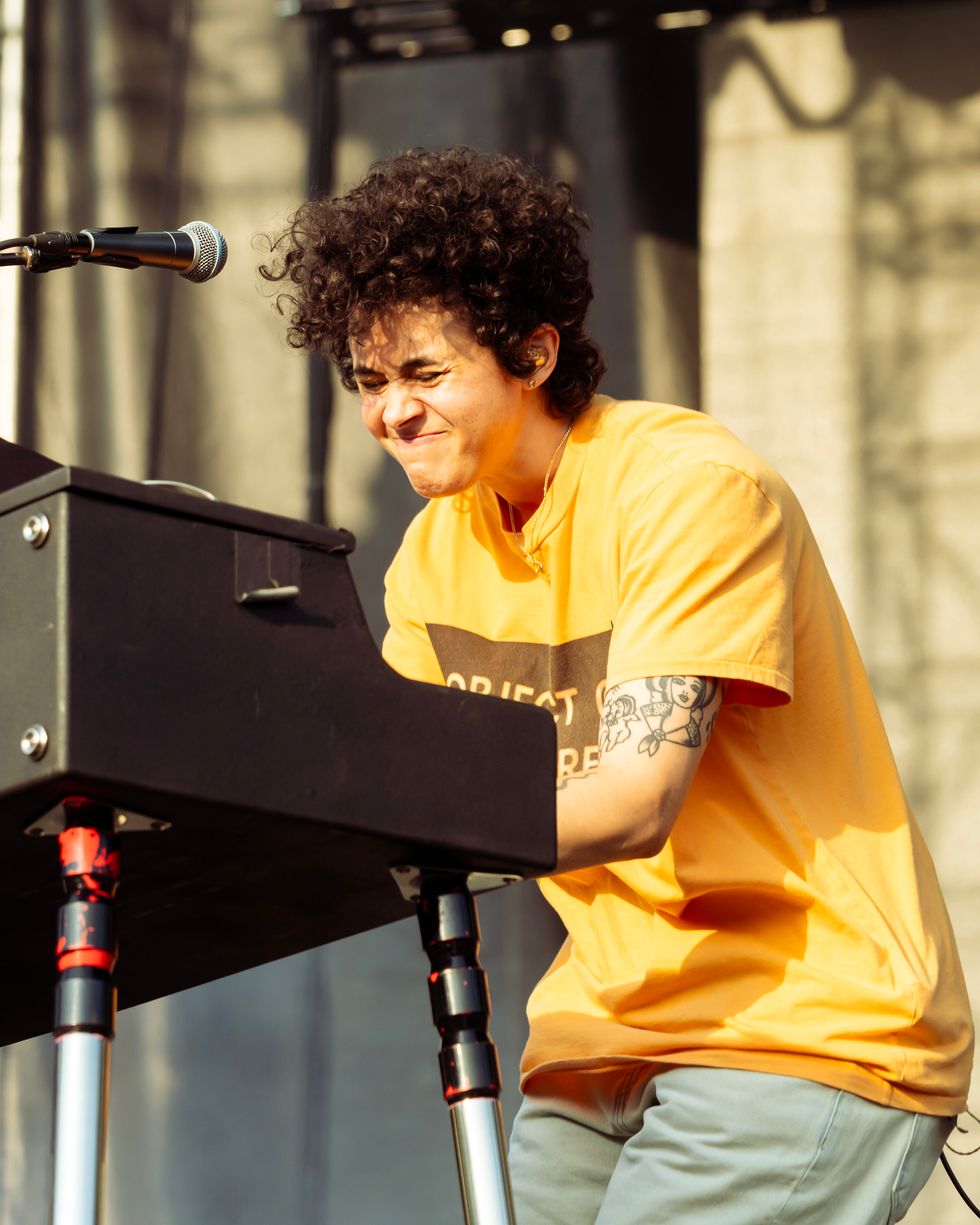
MUNA on New Music: 'It's Time to Cook'
By Tobias Hess
Jul 23, 2024I'm huddled with MUNA against the side of Pitchfork’s red stage, convened around a small plastic picnic table. Chicago’s summer heat is sweltering and the ambient thrash of Model/Actriz playing mere feet away isn't instilling a calm vibe. Plus, President Joe Biden has just announced he would not be running for re-election just a few hours prior. There's a lot of chaos that could have made this Pitchfork fest feel like a chaotic riot, but somehow, MUNA and I are suspiciously calm.
I get the sense that MUNA isn’t really phased by much. The band — comprised of singer Katie Gavin, guitarist Naomi McPherson, and guitarist and synth-wiz, Josette Maskin — has been making music for 10 years together. Throughout that time they encountered their fair share of what Maskin calls “little failures.” But these days, those obstacles are looking miniscule when compared to the gargantuan success they’ve seen since signing to Phoebe Bridgers’s Secretly Canadian imprint Saddest Factory Records and releasing a self-titled album which includes the still-ubiquitous summer siren call, “Silk Chiffon.”
It couldn’t have been any other way. Before their self-titled album they were signed to RCA for two records. Those projects helped the band gain a buzzy, queer following, but they didn’t necessarily align with the mega-scale of a major label framework. Working with Bridgers, a major indie mover, allowed them to build things from the ground up. And build they did. Since they released MUNA two years ago, the band has been constantly on tour, including a support slot of Taylor Swift’s record-breaking Eras Tour and two nights in Los Angeles’ Greek Theater, a performance which has been etched in stone through MUNA’s most recent release, Live at the Greek Theatre in Los Angeles.
In the end, they probably did end up reaching the level of mainstream notoriety a major label would pine for, but doing it indie allowed MUNA to have more control and foster a deep, enduring relationship with their audience. “Once you get to a certain point, it's not in your control how big something gets,” Gavin tells me. “So I'm very grateful that even at the end, playing two shows at the Greek, it still felt like our people.” “Those people,” the MUNA fans, understand the band better than most fans do. They have a uniquely large amount of access points to the trio — be it via their irreverent podcast, Gayotic, where the three talk off the cuff about their lives as queer artists or via their ever-humming online lives.
Their fans especially can appreciate the significance of MUNA playing Pitchfork fest. The band received a 7.7 score for their sophomore album, Saves The World, a score artist Shamir noted as being the “essential gay listening’ bat signal” (other members of the 7.7 club include Charli XCX’s how i’m feeling now, Lana Del Rey’s Blue Bannister’s, and Mitski’s Bury Me at Makeout Creek). 7.7 is not nothing, but the band was “sure they’d get Best New Music [with their next record, MUNA],” as Gavin told me. Well, MUNA did get an improved score ... of 7.8. They took it all in stride, though and even got that sacred 7.7 as matching tattoos. But regardless of Pitchfork’s scoring, when it was later time for MUNA to take the stage, they performed for an ocean of people in Union Park, many of whom seemed to be tried and true MUNA fans, a rare feat at a busy music festival where folks are coming for all sorts of acts.
Well, PAPER is thrilled to announce some good news for those fans: the band is wrapping up their busy two years of touring MUNA and are preparing to get in the studio to finally “cook.” I smell good things.
PAPER chatted with the band before they took the Pitchfork stage to talk about this wild ride of an album cycle, Katie Gavin’s forthcoming solo record and maintaining a healthy friendship with each other through the chaos of the industry.
Super excited to talk with you! I love MUNA and I know PAPER loves MUNA.
Naomi McPherson: Justin [Moran, PAPER’s editor-in-chief] knows how much of a real one he is.
Katie Gavin: Justin was working for BULLETT magazine and he was the first person ever to write about us, so I feel a kinship with PAPER.
That’s wild! I've been an active fan since Saves The World, so to see the ascent has felt crazy. We're two years out from your last record, MUNA, and you just put out your live record from your two performances at The Greek. Was that live record a way of putting a pin on this very crazy era?
McPherson: I think that we did see that as a way to wrap up this album cycle, which lasted longer than we could have possibly imagined. For the Saves The World tour we did in the fall of 2019, when we finished that, we were with our old label, and were like, “We’re not going to tour that record again.” We loved our A&R guy at RCA and never want it to seem like we're talking shit on them, because we're not. But we were trying to move on, because there was not enough support behind the album. It wasn't breaking through to enable us to have a sustained touring career. With this album, we're still touring it two years later. We achieved a lot of what we wanted to achieve, and knocked a lot of the things off the manifestation list. So it's time to make a new one, right?
Josette Maskin: We're gonna turn the page and see what's next. Which I think is something that we all really like. We obviously love playing live shows, but I think we're all super creative people, and the concept and the genesis of everything is our bread and butter. So it will be interesting now that we have the time to actually cook. We need to cook for a minute.
Gavin: Something I'm grateful for with that cycle is I think a lot of times in this day and age people are able to have a sense before [success], so they can have a chance to be ready. And I do actually think looking back we were ready [for this success].
Maskin: We were ready, and that's the most amazing part. We wouldn't have been able to perform as well on those stages if we hadn't had all those little failures before.
Gavin: We've been grinding. We've been cutting our teeth out on the road, and I don't think that it got to a level that was beyond what we could handle and that's out of your control. Once you get to a certain point, it's not in your control with how big something gets. So I'm very grateful that even at the end, playing two shows at the Greek, it still felt like our people and it wasn't traumatizing.
I think you guys have also done a really good job of maintaining a very close relationship with your audience through the podcast. So I'm curious about how you're thinking about those extra-musical endeavors?
Maskin: It's so funny because our manager during the pandemic was like, “Maybe you could have this other way to make money? You need to do something.”
McPherson: We had considered doing podcasts or YouTube series before, because we do have interests outside of music, and when we did press around our first two albums [we felt] that people didn't really know us, because the music really is so intense, dark and serious. That is a pretty big aspect of who we are as people. But it's definitely not the only thing that you get from us when you interact with us. We have big personalities and we're hams and we like to joke and laugh around. So it was a nice way for us to be able to showcase our personalities.
Maskin: You’re selling a product. And, I mean, the product is us. Like, even with music, it's true. [The band laughs.]
Headline!
Maskin: Yeah, “MUNA: capitalist pigs.” But I mean, it is just true. You need to show people what you're about, because what else is going to get them invested in you? [You need something] more than [people saying], “Oh, I streamed their song on Spotify. I don't care about going to shows.” We have active relationships [with our fans].
Gavin: Having the podcast be us talking to each other allows people [to see] behind the curtain in a way that I think is humanizing. I feel like our fans give us space to complain about things that are hard.
McPherson: It's silly, goofy, but it's also serious sometimes. We do talk about class-related stuff, and our experience as musicians.
Gavin: And just the troubles of working all the time, and what it really is like to have a career in music. So that's been nice to feel like we don't have to put up a front to “be” MUNA.
McPherson: There are people who listen to the podcast and do not enjoy or listen to our music. And there are people who love our music, who probably hate the podcast.
That’s trippy. Y’all are diversified!
Maskin: Yeah, all of our revenue streams [laughs].
Given the podcast and how public you are with your relationship as bandmates, how do you maintain some privacy in this working friendship?
Maskin: We’re working on that. We're talking about stuff [on the podcast], but I think we're trying to not share as much ...
Gavin: You guys are trying to get me to not share as much.
Maskin: I don't care what you do. I need to keep some secrets about myself!
Mcpherson: We started the podcast and thought No one is ever going to listen, so we were gonna talk about whatever we want and who cares? And now it's like, “God, what have we done?”
Gavin [quietly singing “Pink Pony Club” by Chappelle Roan]: “God what have we done?”
Mcpherson: Yeah, my mom will text me like, “I watched the episode that you did with so and so.” So I'm like, "I thought you didn't listen to this? Now I need to change my whole energy, because I thought I was talking to my friends?"
Gavin: We're about to go into a period of time where we have more time blocked up for us to be in the studio together. I think that is going to make a big difference because most of the time, we hang out when it's being recorded for the podcast.
Maskin: I mean everyone's just busy doing their shit. [Katie’s] putting out a record. I'm trying to stay at my house as much as possible.
Yeah, Katie, I’m excited about your solo project!
Mcpherson: So there’s huge tensions... [laughs]
Yeah, I was thinking “This is obviously exciting and you are all seemingly fine.” But stereotypically, “going solo” is a “problem” in bands.
Maskin: We’re gonna break up for sure.
Mcpherson: We're gonna break up before she puts it out, maybe a day before ...
Gavin: I feel like we should leave it ambiguous to fan the flames of PR.
Mcpherson: And then next cycle ... you're totally right. We need to save this toxic energy. We need to bottle it.
Gavin: So people can put together a narrative.
Mcpherson: Katie was forced to make a solo album because we said no to too many of her songs.
I mean that just makes sense when you're creating in a group.
Gavin: There were just too many songs that weren't for the MUNA world, but I still wanted them to be out. That's just how I am as a creative; I want stuff I write to be released at some point. We originally thought it was going to come out before MUNA, but it just didn't work out that way. I signed to Phoebe, and she wanted me to go back in with her producer. And so after, we decided we'll put it out after the third album. So yeah we've been knowing about this and we've had time to adjust. I also think when you've been a band for 10 years, it's healthy to have side quests and go on other endeavors, so that you can come back and bring that new energy.
Mcpherson: “Side quests.” You can tell how terminally online we are.
I mean me too, so no worries on that. I want to also ask about the Dance Churches. Your fans gathered to dance to your music throughout Pride.
Maskin: [Our team] pitched us the idea and I think the thing that's so special about MUNA fans is that they actually are in community with each other. So actually having a physical space where people can go connect, make more friends, or connect with the friends that they already have through online chat groups, is so cool. People can actually meet up and start dating and meet somebody who they feel understands them. So it was a deeper way that we can connect [with fans] without us constantly having to tour.
And is this your first time playing Pitchfork?
Mcpherson: Yeah.
Do you have any specific feelings on that? I know Pitchfork looms large in the minds of musicians.
Maskin: They should have given us a higher Pitchfork score, but other than that ...
Mcpherson: Pitchfork haunts me in my dreams. [laughs]
Maskin: They did a review and [we got] tattoos for [the score] 7.7 because it was like “the gay ten.”
Mcpherson: We have to give credit where it’s due, the artist Shamir noticed that all these iconic queer artists got 7.7 so we were like, “LOL. Wouldn't it be hilarious if we got a 7.7 tattoo, because that's what Saves The World got?” And then they gave us a 7.8 for MUNA, because they are petty.
Gavin: We were so sure we were gonna get Best New Music.
Mcpherson: We were like, “It’s gonna be an 8.”
Maskin: They know they have beef with us even though we’re here.
Gavin: I would go on Pitchfork because I wanted to be cool to the boys in highschool. But I found a lot of music on Pitchfork.com. And we love to “hate” on Pitchfork, but I’d be sad if they went away.
Okay, I know you have to go, but I think the headline is: “MUNA going back to the studio,” right?
Mcpherson: Pray for us!
Photography: Kimberly Ross
From Your Site Articles
- Model/Actriz at Pitchfork Festial - PAPER Magazine ›
- MUNA's Katie Gavin Talks Solo Album "What a Relief" - PAPER Magazine ›
- MUNA Goes for "Dyke Boy Band" Supremacy on New Album - PAPER Magazine ›
Related Articles Around the Web
MORE ON PAPER
ATF Story
Madison Beer, Her Way
Photography by Davis Bates / Story by Alaska Riley
Photography by Davis Bates / Story by Alaska Riley
16 January
Entertainment
Cynthia Erivo in Full Bloom
Photography by David LaChapelle / Story by Joan Summers / Styling by Jason Bolden / Makeup by Joanna Simkim / Nails by Shea Osei
Photography by David LaChapelle / Story by Joan Summers / Styling by Jason Bolden / Makeup by Joanna Simkim / Nails by Shea Osei
01 December
Entertainment
Rami Malek Is Certifiably Unserious
Story by Joan Summers / Photography by Adam Powell
Story by Joan Summers / Photography by Adam Powell
14 November
Music
Janelle Monáe, HalloQueen
Story by Ivan Guzman / Photography by Pol Kurucz/ Styling by Alexandra Mandelkorn/ Hair by Nikki Nelms/ Makeup by Sasha Glasser/ Nails by Juan Alvear/ Set design by Krystall Schott
Story by Ivan Guzman / Photography by Pol Kurucz/ Styling by Alexandra Mandelkorn/ Hair by Nikki Nelms/ Makeup by Sasha Glasser/ Nails by Juan Alvear/ Set design by Krystall Schott
27 October
Music
You Don’t Move Cardi B
Story by Erica Campbell / Photography by Jora Frantzis / Styling by Kollin Carter/ Hair by Tokyo Stylez/ Makeup by Erika LaPearl/ Nails by Coca Nguyen/ Set design by Allegra Peyton
Story by Erica Campbell / Photography by Jora Frantzis / Styling by Kollin Carter/ Hair by Tokyo Stylez/ Makeup by Erika LaPearl/ Nails by Coca Nguyen/ Set design by Allegra Peyton
14 October
















